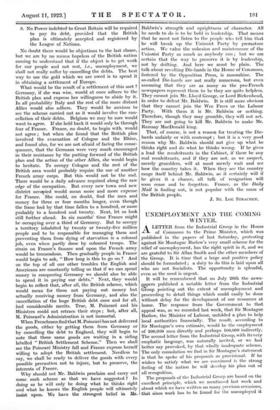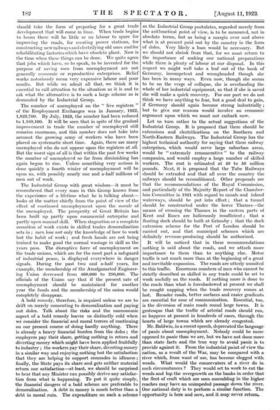UNEMPLOYMENT AND THE COMING WINTER.
ALETTER from the Industrial Group in the House of Commons to the Prime Minister, which was published in the papers of last Saturday, protesting against Sir Montague Barlow's very small scheme for the relief of unemployment, has the right spirit in it, and we are grateful to Sir Allan Smith and the other members of the Group. It is time that a large and positive policy should be formulated ; a duty to do this is laid upon all who are not Socialists. The opportunity is splendid, even as the need is urgent.
It will be remembered that on July 26th the news- wers published a notable letter from the Industrial Group pointing out the extent of unemployment and proceeding to detail things which could easily be done without delay for the development of our resources at home. The response from the Government to that appeal was, as we recorded last week, that Sir Montague Barlow, the Minister of Labour, unfolded a plan to help local authorities financially. The result, according to Sir Montague's own estimate, would be the employment of 200,000 men directly and perhaps 100,000 indirectly. The second letter from the Industrial Group, with its very emphatic language, was naturally invited, or we had better say provoked, by that wholly inadequate scheme. The only consolation we find in Sir Montague's statement is that he spoke of his proposals as provisional. If he wishes to satisfy what we are convinced is the strong feeling of the nation he will develop his plan out of all recognition. The proposals of the Industrial Group arc based on the excellent principle, which we mentioned last week and about which we have written on many previous occasions, that since work has to be found for the unemployed it should take the form of preparing for a great trade development that will come in time. When trade begins to boom there will be little or no labour to spare for improving the roads, for creating power stations, for constructing new railways and electrifying old ones and for rehabilitating factories which have obsolete plant. Now is the time when these things can be done. We quite agree that jobs which have, so to speak, to be invented for the purpose of saving men from unemployment are not generally economic or reproductive enterprises. Relief works notoriously mean very expensive labour and poor results. But while we admit all that, we think it is essential to call attention to the situation as it is and to ask what the alternative is to such a large scheme as is demanded by the Industrial Group.
The number of unemployed on the " live registers " of the Employment Exchanges was in January, 1922, 1,823,700. By July, 1923, the number had been reduced to 1,189,100. It will be seen, that in spite of the gradual improvement in trade the number of unemployed still remains enormous, and this number does not take into account the growing army of workers who have been placed on systematic short time. Again, there are many unemployed who do not appear upon the registers at all. But the worst sign of all is that within the past few weeks the number of unemployed so far from diminishing has again begun to rise. Unless something very serious is done quickly a. fourth winter of unemployment will be upon us, with possibly nearly one and a-half millions of men out of work.
The Industrial Group with great wisdom—it must be remembered that every man in this Group knows from the experience of a lifetime what he is talking about— looks at the matter chiefly from the point of view of the effect of continued unemployment upon the morale of the unemployed. The prosperity of Great Britain has been built up partly upon commercial enterprise and partly upon manual skill. When stagnation or a complete cessation of work exists in skilled trades demoralization sets in ; men lose not only the knowledge of how to work but the habit of work ; and fresh hands are not being trained to make good the normal wastage in skill as the years pass. The disruptive force of unemployment on the trade unions, which are for the most part a safeguard of industrial peace, is displayed everywhere in danger signals. During the past two and a-half years, for example, the membership of the Amalgamated Engineer- ing Union decreased from 460,000 to 290,000. The officials of the Union say that if the present rate of unemployment should be maintained for another year the funds and the membership of. the union would completely disappear.
A bold remedy, therefore, is required unless we are to drift on: merely consenting, to demoralization and paying out doles. Talk about the risks and the uneconomic aspect of a bold remedy leaves us distinctly cold when we consider the financial and moral terrors of continuing: on our present course of doing hardly anything. There is already a heavy financial burden from the doles ; the employers pay their share, getting nothing in return and diverting money which, might have been applied fruitfully; to industry ; .the workers pay their share, diverting:money in a similar way and enjoying nothing but the satisfaction that they are helping to support comrades in idleness ; finally, the State pays its share and gets neither material return nor satisfaction—at least, we should be surprised: to hear that any Minister can possibly derive any satisfac- tion from what is happening. To put it quite simply, the financial dangers of a. bold scheme are preferable to. demoralization. A debt. in money is much better than a debt in moral ruin. The expenditure on such a.scheme as the Industrial Group postulates, regarded merely from the arithmetical point of view, is to be measured, not in absolute terms, but as being a margin over and above what is at present paid out by the country in the form of doles. Very likely a loan would be necessary. But we should not shrink from that, for we must return to the importance of making our national preparations while there is plenty of labour at our disposal. In this respect we might well take a leaf out of the book of Germany, incompetent and wrongheaded though she has been in many ways. Even now, though she seems to be on the verge of collapse, she is overhauling the whole of her industrial equipment, so that if she is saved she will make a quick recovery. For our part we do not think we have anything to fear, but a good deal to gain, if Germany should again become strong industrially ; but to give our reasons would involve an economic argument upon which we must not embark now.
Let us turn rather to the actual suggestions of the. Industrial Group. It is proposed that there should be extensions and electrification on the Southern and North-Eastern Railways. The Industrial Group has the highest technical authority for saying that these railway enterprises, which would serve large suburban areas, would be " extremely remunerative " to the railway companies, and would employ a large number of skilled workers. The cost is estimated at 40 to 50 million pounds. Next, it is proposed that the Tube Railways should be extended and that all over the country the railways should be reconditioned. Other proposals are that the recommendations of the Royal Commission, and particularly of the Majority Report of the Chamber- lain Committee in 1921 with regard to canals and inland waterways, should be put into effect ; that a tunnel should be constructed under the lower Thames—the means of crossing the Thames in the eastern parts of Kent and Essex are ludicrously insufficient ; that a floating dock should be built at Grimsby ; that the dock extension scheme for the Port of London should be carried out, and that municipal schemes which are definitely revenue-producing should be authorized.
It will be noticed that in these recommendations nothing is said about the roads, and we attach more importance to them than to anything else. Motor traffic is not much more than at the 'beginning of a great and inevitable expansion. The roads are utterly unsuited to this traffic. Enormous numbers of men who cannot be strictly described as skilled in any trade could be set to work usefully on the roads. If nothing more is done to the roads than what is foreshadowed at present we shall be caught napping when the trade recovery comes at last. Broader roads, better surfaces and, easier gradients are essential for ease of communication. Essential, too, is the diversion of main roads round large towns. It is grotesque that the traffic of arterial roads should run, as happens at present in hundreds of cases, through .the hearts of large towns which are already congested.
Mr. Baldwin,.in a recent speech, deprecated the language• of panic about unemployment. Nobody could be more opposed to panic than we are, but we have not done more than state facts and.the true way to avoid panic is to provide against it. From the industrial point aview the nation, as a result of the.War, maybe compared with a river which, from want of use, has become clogged with weeds, What would the conservators of a river do in such circumstances ? They would set to work. to cut the weeds and lop the overgrowth on the banks in order that the fleet of craft which are seen assembling in the higher reaches may have an unimpeded. passage down the river. Our national: duty is to perform a similar function. The opportunity is here and now and. it may, never return,



































 Previous page
Previous page